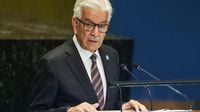NEW DELHI: Pakistan's Defence Minister Khawaja Asif ignited controversy on Saturday, May 10, 2025, by asserting that madrasa students are the country's "second line of defence" in the event of war with India. Speaking to Parliament, Asif emphasized that these students would be deployed when necessary, stating, "As far as madrasa and their students are concerned, there is no doubt that they are our second line of defence. The youth who study there are well connected with the religion ... they can be used 100% for the city or for other needs." This statement came amid heightened military tensions between the two nations.
Asif's remarks sparked a wave of criticism, especially following a day where he deflected blame for the failure of the Pakistan armed forces to intercept Indian drones. He claimed that Pakistani forces deliberately avoided engagement to prevent revealing strategic military positions to the enemy. "The drone attack that happened yesterday was basically carried out to detect our locations. This is a technical matter which I won’t explain in detail," he stated. He added, "And that is why they were not intercepted — so that our locations are not leaked." This explanation raised eyebrows, particularly as it contradicted earlier statements from the Pakistan Army regarding the effectiveness of their defensive measures.
Earlier in the week, Asif faced significant backlash for his inability to provide credible evidence supporting his claim that Pakistan had shot down five Indian jets during India’s Operation Sindoor. When pressed for details during an interview, Asif cited "social media" as his source, prompting a sharp rebuke from CNN anchor Becky Anderson, who reminded him that social media is not a reliable basis for military claims. "It's all over social media—on Indian social media, not on ours. The debris of these jets fell into Kashmir," he asserted, further complicating his credibility.
This escalation in rhetoric and military action comes on the heels of Indian forces conducting precision strikes on May 7 against identified terror launchpads in Pakistan and Pakistan-occupied Kashmir (PoK) in retaliation for an attack on April 22 that resulted in the deaths of 26 civilians. Colonel Sofiya Qureshi, during a special government briefing, confirmed that Indian armed forces targeted multiple military installations in response to Pakistan's aggression, which included the firing of several high-speed missiles at Indian air bases.
"After Pakistan deliberately targeted air bases, Indian armed forces took a quick and well-planned retaliatory action and targeted technical installations, command & control centres, radar sites, and arms store. Pakistan military bases at Rafiqui, Murid, Chaklala, Rahim Yar Khan, Sukkur, and Chunian were targeted through air launch, precision ammunition, and fighter jets," Qureshi detailed. Additionally, a radar site in Pasrur and an aviation base in Sialkot were also struck with precision ammunition.
On the same day, Asif contradicted a statement made by the Pakistan Army regarding a meeting of the National Command Authority (NCA), which oversees the country's nuclear arsenal. He stated on ARY TV, "No meeting has happened of the National Command Authority, nor is any such meeting scheduled," dismissing claims made by the Army that Prime Minister Shehbaz Sharif had called for the meeting. Asif downplayed the threat of nuclear war between the two countries, suggesting that it should be treated as a distant possibility.
Earlier on the same day, Pakistan escalated the ongoing conflict by launching drone attacks targeting Indian military installations, including at least one ballistic missile aimed at Delhi, which was intercepted over Sirsa, Haryana. India retaliated, striking three key airbases: the Nur Khan airbase at Rawalpindi’s Chaklala, the Murid airbase in Chakwal district, and the Shorkot airbase in Punjab’s Jhang.
As tensions continued to escalate, Asif's controversial comments drew attention to the historical context of madrasa students being utilized in military conflicts. His assertion that these students would be used as a second line of defence underscores a troubling trend in Pakistan's military strategy, which has often involved leveraging religious seminaries in conflict scenarios.
In the wake of Asif's statements, social media users quickly began to mock him for citing social media as a source of information regarding military actions. One user quipped that he used a similar excuse during a project presentation, while another suggested that he might need a hearing aid after fumbling during a live interview when asked for evidence of Indian strikes.
While Asif's comments have been met with widespread ridicule, they also highlight a serious issue regarding the Pakistani government's approach to the ongoing conflict with India. Asif's previous admission that Pakistan has engaged in "dirty work" by supporting terrorism as a means of foreign policy has further damaged his credibility and raised questions about the country's military and diplomatic strategies.
In a significant development, the US Secretary of State Marco Rubio engaged in conversations with both Pakistan's army chief General Asim Munir and India's External Affairs Minister S. Jaishankar, urging both nations to pursue de-escalation. Jaishankar reaffirmed that India's response had been measured and responsible, emphasizing its commitment to regional stability.
As the situation continues to unfold, the international community is closely monitoring the escalating tensions between India and Pakistan. The rhetoric from both sides, particularly from Pakistan's Defence Minister, may have long-lasting implications for regional security and diplomatic relations.

